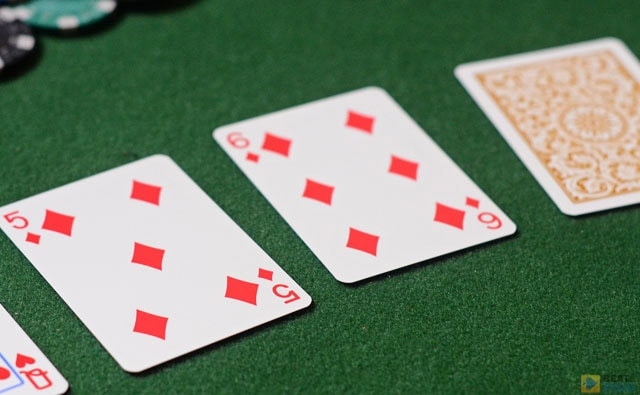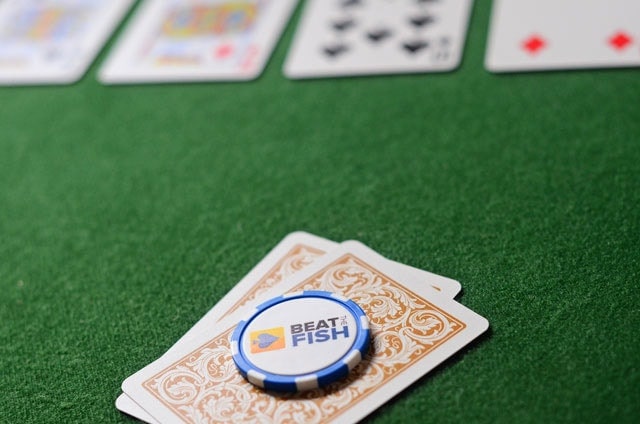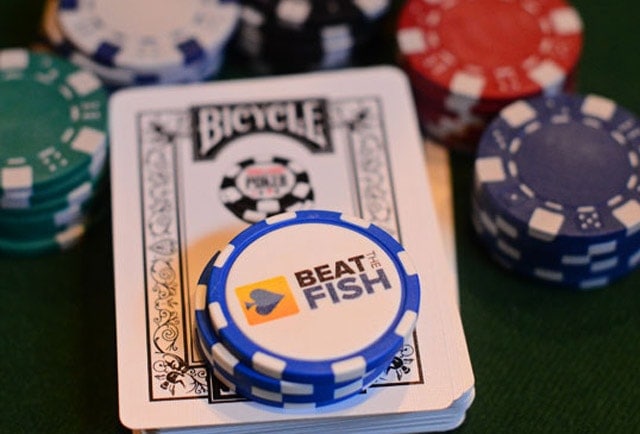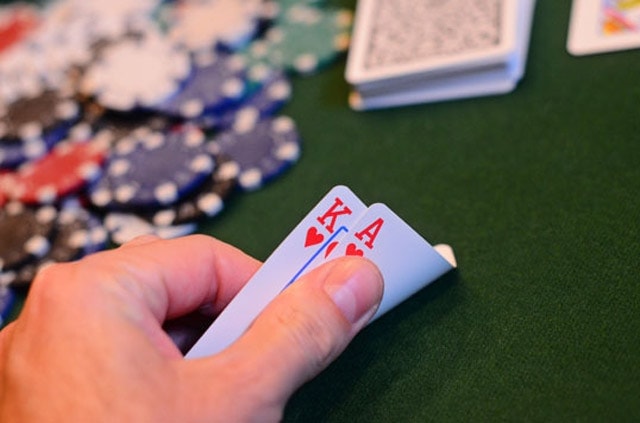How to Use Continuation Bets

Perhaps most popularized by Dan Harrington’s segment on them in the first Harrington on Hold’em volume, continuation bets have become a standard play in all no-limit Hold’em cash games and tournaments.
Even though it may an overused play, it is also still a smart and aggressive play and one that should certainly be a part of every no-limit player’s arsenal.
Now that you know continuation bets are so important what exactly are they and how do you use them most effectively?
Let’s dive into a general overview on what continuation bets are, how you should use them, and how to defend against them.
Table of Contents
- What is a continuation bet?
- Why are continuation bets so effective?
- What are the best opportunities for continuation bets?
- How far should you take continuation bets?
- How can you defend against continuation bets?
- Specific plays I like to make with a c-bet
- Making and reacting to continuation bets has become essential Hold’em strategy
What is a continuation bet?
- A continuation bet is simply a follow-up bet made on the flop by the preflop aggressor.
Usually, the flop continuation bet is anywhere from 1/2 to the full size of the pot. For example, I’m playing a $2/4 no-limit cash game and I raise to $16 from early position with A-K. Only the button calls. The flop comes J-4-2 rainbow and I bet out $30. The $30 bet would be a continuation bet.

The goals of making this play are:
- To pick up the pot right away when you miss the flop
- To build a pot when you have a made hand
- To pick up information when you’re unsure where you stand.
However, the term continuation bet is usually used when referring to a bet that is designed to pick up the pot on the flop with a missed hand like A-K. In this article that’s what I’m referring to.
Why are continuation bets so effective?
- Continuation bets can be very effective because the natural assumption is that the preflop raiser has a strong hand.
When the raiser bets out again (especially out of position), this confirms that strength. When you raise from early position, your opponents are likely going to assume that you have a medium-to-big pocket pair or a big Ace. After all, that is the textbook play with those hands from that position.
When you do get called from another player or two and see a ragged flop it’s likely that they missed the flop. Specifically, the odds state that unpaired hole cards will only pair up on the flop only about 33% of the time.
By betting out in this position, you continue to show strength and make it easy for your opponents to fold unless they connected on the flop, which is much less likely.
Taking advantage of other tight players
As many players at medium-stakes tables and small-stakes tournaments play tight and by the book this play can be especially effective regardless of what cards you hold.
Of course, some of the time you do connect on the flop and you’ll be making the same bet. The challenge that you make your opponents face is figuring out when you have it and when you don’t.
What are the best opportunities for continuation bets?
Obviously, the likelihood of your opponents flopping a strong hand is greater when you have 4 opponents rather than just one.
Therefore, you’re much more likely to pull off a successful continuation bet when heads-up or facing, at most, 2 players. Overall, I wouldn’t recommend bothering with continuation bets with 3 or more players as you’re very likely to be at least called.

If you don’t have a strong hand in a crowded field, you’re better off saving your chips and folding to any action. You should also tend to bet out awkward flops like 7-4-2 or J-8-3 rather than a flop like Q-J-9 suited as the latter is much more likely to have helped your opponents.
Considering your table image for continuation bets
Finally, consider your table image. You can get away with a continuation bet more if you haven’t been involved in many pots and/or have been showing down strong cards. Another spot I recommend a continuation bet is when you have a pocket pair like Queens or Kings, raised from early position, and an overcard flops.
Even though you fear that your opponent has connected, he also fears the same thing from you. Bet out, continue your aggression, and you can often make good players lay down a better hand with an average or weak kicker.
How far should you take continuation bets?
A problem I’m often asked about is one that most players seem to have trouble with: what do I do on the turn when I’m called on the flop and I don’t improve?
This is an understandably difficult situation as you haven’t really gained much information on the flop but have to weigh committing more chips with (likely) the worst of it to the potential of picking up the pot by firing a second bullet.
Unfortunately, I don’t really think there is a concrete answer to this question as it relies heavily on the situation at hand.
A look at some specific c-bet examples
For example, if you know that your opponent is a calling station, then you wouldn’t want to bet out again unless you’ve improved.

However, if you put your opponent on a flush draw, you should consider betting out strongly on the turn if the flush didn’t hit. If you’re very confident in your read, you might even carry this through to the river if the draw doesn’t hit. Try to step outside of the situation and look at how you’ve represented your hand objectively.
Against weak and loose online players, I would suggest for you to check/fold if your bet isn’t successful on the flop.
These are the type of players who will call you down with a weak top pair or second pair and make it a very expensive bluff on your part.
Overall, I would summarize by saying that you should mostly give up on the turn unless you have a good reason to believe that you can get your opponent to lay down his hand.

DON'T
...spend another penny on yet another poker book.
I'm giving away my 6-part course if you download it in the next 24 hours.
"The whole PDF on the Beat The Fish guide was absolute gold for me. Very impressed, has really made a difference to how I play my game from when I first started. Definitely built up my confidence in the game and helping me to stop spewing off chips." -Dylan Walsh
How can you defend against continuation bets?
The simple answer would be to call more often in position with your medium-strong hands. As you gain experience you’ll get better at telling the difference between a continuation bet and a genuine value bet from your opponents.
For example, let’s say that you called an $8 raise in a $1/2 no-limit game from the button with 9-10 suited. You’re heads-up on a flop of 9-J-2 with the early position raiser betting out $12. This is a good situation to call as your opponent often missed this flop with two high cards and a fairly weak bet.
Be aware that being in position is crucial to picking off continuation bets. A dead giveaway of a continuation bet would be a preflop raiser who bets out about 3/4 of the pot on the flop and then checks on the turn after you call. Try to take the pot away from him with a strong bet.

Specific plays I like to make with a c-bet
With the continuation bet becoming such a standard textbook play your opponents will know that you’ll use it even if you don’t connect on the flop. A play I like to make occasionally is the “fake” continuation bet with a big hand.
The fake continuation bet
For example, let’s say that I have pocket Aces from under the gun and make a standard 4x preflop raise. If I get one caller and see a ragged flop, I will often bet out 1/2 of the pot or so.
If I get called, I will check on the turn and indicate that I’m giving up. In reality, I’m setting up for a big check-raise. You can do this with a set or any number of big, but seemingly unlikely, hands.
Making and reacting to continuation bets has become essential Hold’em strategy
In conclusion, the continuation bet is mostly used when you raise preflop and thin the field but don’t improve on the flop. It works because your opponents likely didn’t improve, either, and expect you to have a big hand. However, you should tend to follow the strength of your cards when you’re facing multiple opponents or a scary board.
Start to learn the patterns of players that indicate this type of bet and defend against them. Finally, I find that the continuation bet is more effective overall in tournaments as opposed to cash games. Your opponents realize that they have a finite amount of chips in tourneys and seem to be less willing to risk them against apparent strength.
Josh is one of the world’s most respected online gambling experts. He has been featured on outlets such as CardPlayer, the World Poker Tour, Google News, and Forbes. Josh has nearly 20 years of experience reviewing poker rooms, casinos, and online sportsbooks. He launched Beat The Fish in 2005, which has been peer-certified as a trustworthy gambling portal. Josh’s proven systems and extensive knowledge of the iGaming industry have been used by thousands of online bettors to make more informed decisions.








